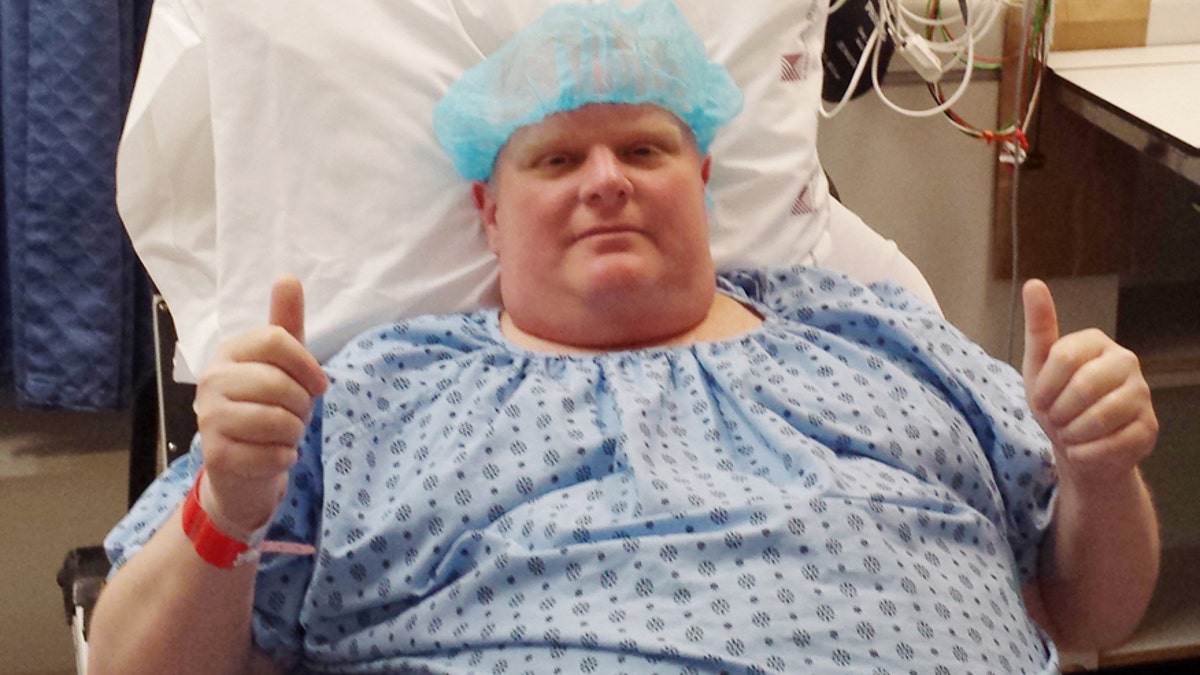
FILE - In this Monday, May 11, 2015 photo provided by Dan Jacobs, former Toronto Mayor Rob Ford gives a thumbs up before surgery in Toronto, to remove a cancerous tumor from his abdomen. On Thursday, March 17, 2016, Ford's chief of staff, Jacobs, said doctors are working on building his strength to be able to resume chemotherapy. In October 2015, doctors also discovered two cancerous growths on his bladder. He has been in the hospital since late February. (Courtesy Dan Jacobs via AP)
Former Toronto Mayor Rob Ford died on Tuesday, March 22, after his fight with a rare and fast-growing cancer called pleomorphic liposarcoma.
Ford's family released a statement: "With heavy hearts and profound sadness, the Ford family announces the passing of their beloved son, brother, husband, and father, Councillor Rob Ford, earlier today at the age of 46. A dedicated man of the people, Councillor Ford spent his life serving the citizens of Toronto."
Live Science published this article (below), on Sept. 18, 2014, at the time of Ford’s diagnosis:
Toronto Mayor Rob Ford has been diagnosed with an extremely rare and fast-growing cancer, called pleomorphic liposarcoma, one of his doctors announced Sept. 17).
Dr. Zane Cohen, one of the physicians treating Ford, said the tumor is about 2 to 3 years old, and described it as "very rare" and "very difficult," according to the Associated Press. The cancer is spreading and the mayor will soon receive intensive chemotherapy, said Cohen, who is a colorectal surgeon at Mount Sinai Hospital in Toronto.
The controversial mayor gained notoriety in 2013 after he admitted to smoking crack cocaine and drinking excessively while in office, and later made lewd comments to reporters about oral sex.
Liposarcoma is one type of "sarcoma," which are cancers that arise from soft tissue such as fat, joints, muscle, nerves or blood vessels. Liposarcoma begins in the connective tissue, with cancer cells that resemble fat cells, according to the Liddy Shriver Sarcoma Initiative, a nonprofit group that advocates for people with sarcomas. (In contrast, cancers that originate from the tissues lining the organs are called carcinomas or adenomas.)
Soft tissue sarcomas are not very common — they account for less than 1 percent of all cancers in adults. In 2014, an estimated 12,000 people in the United States will be diagnosed with these cancers, and about 4,700 people will die of these cancers, according to the American Cancer Society (ACS). For comparison, about 136,000 people are diagnosed with colon cancer yearly, and 232,000 people are diagnosed with breast cancers. [The 10 Deadliest Cancers and Why There's No Cure]
Ford's cancer, pleomorphic liposarcoma, is the rarest subtype of liposarcoma. Pleomorphic means that all cells within the tumor look different in size and shape under a microscope.
Ford's tumor, measures about 5 inches by 5 inches (12 centimeters by 12 cm), and was found in his abdomen, Cohen said. Liposarcomas can develop anywhere in the body, but are most often found in the thigh, behind the knee or inside the back of the abdomen, according to the ACS. Patients are often diagnosed with this cancer between ages 50 and 65. Ford is 45 years old.
It's not clear what causes liposarcoma, or what factors may increase a person's risk of developing it. Certain inherited conditions that involve defects in several genes are thought to increase a person's risk of developing soft tissue sarcomas. People may also develop sarcomas from radiation treatments they received for another cancer, according to the ACS.
A few studies have looked at whether smoking, drinking and using other drugs may affect the risk of developing sarcomas, but no clear link has been found. One study, published in the American Journal of Epidemiology in 1989, that looked at 228 people with soft tissue cancers and 1,610 healthy people, found a greater risk of sarcomas among those who chewed tobacco.
However, another study of 93 sarcoma patients and 721 healthy people didn't find a link between risk of soft tissue sarcoma and smoking and alcohol consumption, according to the findings published in the journal Cancer Causes and Control in 1991. One study even found smoking was linked to lower risk of developing a type of sarcoma.
Ford's doctors told reporters that they plan to administer two rounds of chemotherapy to him over the next 40 days. They will then assess whether his tumor has responded, and whether surgery is needed.
About 56 percent of patients with pleomorphic liposarcoma live for at least five years after their diagnosis, according to the Liddy Shriver Sarcoma Initiative.
Ford withdrew from his re-election campaign after being hospitalized for his treatment. His brother, Doug Ford, has replaced him on the mayoral ballot.
- 10 Do's and Don'ts to Reduce Your Risk of Cancer
- 7 Cancers You Can Ward Off with Exercise
- 7 Side Effects of Cancer Treatment, and How to Cope with Them
Copyright 2016 LiveScience, a Purch company. All rights reserved. This material may not be published, broadcast, rewritten or redistributed.
